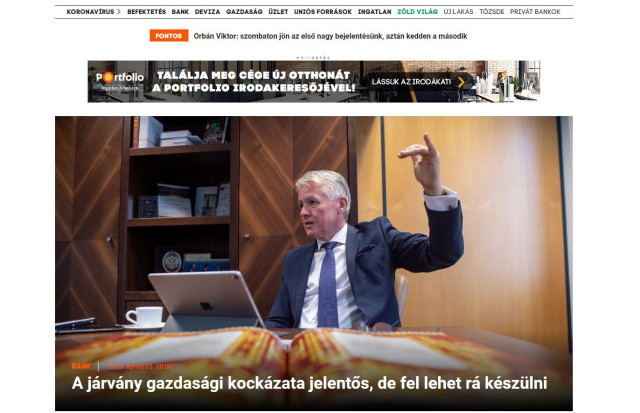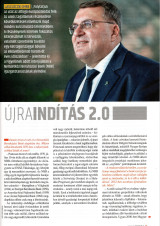Jozef Kollár, First Deputy Chairperson of the IIB Management Board spoke to Portfolio.Hu: The economic risk of the epidemy is considerable, but one can be prepared for this
Source: Portfolio.hu
The economic risk of the epidemy is considerable, but one can be prepared for this.
Moving to Budapest is also supported by financial results, says Jozef Kollár, the bank's head of operations in Europe.
International Investment Bank (IIB), formerly based in Moscow, relocated a major part of its operations to Budapest last year: the new location represents both an opening to European countries and markets and a major challenge for the financial institution. In addition, a few months after the move, the financial institution will have to face a major challenge. Jozef Kollár, IIB's head of European operations, told Portfolio what steps they had to take due to the virus threat and how business is transformed. We also asked the expert about developments in recent months and the transformation of the bank.
A few analysts had expected 2020 to be such an exciting year. How prepared are investment banks for these quick global movements, such as those caused by the virus crisis?
2019 was the slowest year of global economic growth since the 2008 financial crisis. Many expected in 2020 more or less the restoration of the global economy growth rate and its recovery. No-one expected anything close to the Coronavirus occurring, of which, everyone is trying to understand what the full extent of this virus will be.
Nevertheless, OECD cuts global GDP forecast to 2.4% (based on China virus spread only) and to 1.9% (based on global pandemic) from 2.9%, which was the prior expectation for 2020. It would be the weakest global GDP growth since 2009 and the chance of the global recession is growing every day.
We are already facing market volatility, which on the one hand creates the opportunity window for us but the rate cuts by the Fed, as well as, additional monetary stimulus from the ECB will further compress lending margins on the other hand. Generally speaking, banks in US and Europe are more prudent, stricter regulated and more prepared than in 2008 financial crisis.
IIB has close to zero open currency position, we do not hold an equity investment and 70% of our treasury portfolio are very liquid AAA-A safe haven assets. Extremely high capital levels (Basel II capital ratio 34.6%) means that the Bank can withstand very large financial shocks.
Nevertheless, I very much want the world to cope with this pandemics. But personally I am afraid such global shocks unfortunately will become the new standard on our planet.
How does the International Investment Bank work these weeks? What measures have you taken to protect your employees and ensure business continuity?
In the circumstances of an aggravating epidemiological situation in the world, International Investment Bank continues its activities aimed at supporting its member states.
The IIB Management Board promptly approved a number of important decisions to ensure the smooth operation of the Bank and to preserve the health of IIB employees, its partners and clients.
The Bank’s team immediately switched to the remote model of operation, all distant communication channels are established, the IIB staff continues to carry out its functions in full, while remaining available for all interaction with customers and partners via digital channels.
Since the introduction of the remote “smart work” model, the IIB team continues to demonstrate coherence and effectiveness. The Bank did not stop for a minute its operations and lending activities, which is especially important in the current period of high turbulence in the global economy. In accordance with the established schedule were held the on-line meetings of the IIB governing bodies — the Management Board and key committees, which approved few important decisions, including new loans in the interests of the Bank's member states.
The IIB's risk and compliance management systems are in line with the standards of leading international development banks, and their efficiency is acknowledged by international rating agencies as well. The constant monitoring of key performance indicators of our partners with whom the Bank is in constant and close contact is secured by our risk management system. In addition, we conducted comprehensive stress tests for all key borrowers, and today we can confidently say that we do not see any serious risks for the activities of our clients and partners.
As for the treasury portfolio, I can also underline again that most of it is formed byhighly reliable AAA-A3 rated instruments, so the Bank is very well preparedfor this situation.
Last year IIB moved its Hearquartes in Hungary: how would you describe this period in the life of IIB? What has changed in the last few months?
The move of the headquarters was a logical continuation of the process of “Europeanization”. It has been a very exciting period for us as an institution and also for each of us personally. Within a year we had managed to move a lot of staff, establish a temporary premises in Budapest, get familiarized with the new city and also its business community, all that while still being fully immersed in daily business.
Many things had changed. We have a lot of new colleagues, mainly from the EU-countries, now reaching more than 50% of all the staff in Budapest. Also, we have already noted the first successes, that wouldn’t be possible if the Bank would stay in Moscow - improving the cost of funds, recognition of the Bank as Europe-based IFI and of course improvements of credit ratings
Thanks to new European address, our bonds in Hungary are repo-eligible which is well-perceived by our investors. Talking about the process of Europeanization of the Bank, the EU share in Long-term funding portfolio as of the end of 2019 increased to 71% (comparing with 59% year before).
On the asset side the European and in particular the Hungarian loan book is continuously growing hand in hand with the real potential to increase its development impact on Hungarian economy and CEE region as such.
When it comes to business processes nowadays our employees are divided between Budapest and Moscow. Management Board and all collective decision making bodies are located in Budapest, and also all the key Departments are represented in full or by the majority in HQ in Budapest. We are talking mainly about front-offices like Treasury, DCM&FI, Credit & Loans, Strategy, while supporting Departments (Back office, Finance Department, Operations, IT, etc.) operate from Moscow Branch.
The move had no impact on the business efficiency; there are well-organized business processes in place and a highly developed IT infrastructure available. However, it is a big advantage that we are closer to investors and to our clients on the EU territory.
In the middle of February, IIB published audited IFRS financial statements for the past year. Would you comment these results? What were the most important processes of the last year?
The year 2019 will be written in IIB’s history as a kind of milestone in positive terms. The smooth and unprecedented relocation of the Bank’s HQ is a huge milestone for us as an institution as well as for our region. We are now the only investment bank located in the region and we believe that this fact increases visibility and importance of Budapest as an international financial center.
The decision regarding HQ relocation from Moscow to Budapest was taken by our Board of Governors in December 2018 only five months later in May 2019 we have commenced our activities from Budapest. It is important to note that the relocation project was implemented smoothly, without any negative consequences on our daily business. This fact is clearly shown in the financial results of our Bank in 2019.
By the end of 2019the total paid-in capital currently amounted to almost 350 mln EUR following the 20 mln EUR capital injection by Hungary. The share of Hungary increased to 17%, becoming second largest shareholder in IIB, with cumulative EU share reaching 53%, while Russian share went down to 42,9%.
The total assets reached more than EUR 1.3 billion, the net loan portfolio increased by 17% and reached almost EUR 1 bln with a record low NPL ratio which decreased to 1,6%.
Its important to mention that the European Member States’ share in the loan and documentary portfolio amounted to almost 53%.
In 2019 we have placed four series of bond issuances, two in Hungary and one each in Romania and Czech Republic in total volume exceeding EUR 280 million.
The trade finance portfolio reached EUR 126 million, helping trade interconnectivity between our member states as well as import/export from third countries and finally.
IIB’s net profit reached 5.6 million EUR.
Looking at these measurable achievements, my gratitude mainly goes to IIB’s staff. We highly appreciate support from the Hungarian high representatives we are receiving from day one, namely Hungarian Government, Ministry of Finance, Budapest Stock Exchange, Central Depository and Magyar Nemzeti Bank.
A few weeks ago, IIB was named “Best International Issuer of the year” by the Budapest Stock Exchange. How would you describe IIB’s relationship with national stock exchanges like Budapest, Bratislava or Vienna?
One of the main pillars of our mandate is to development of the local capital markets on the territory of our member states. I believe this award is a recognition of our performance on the local debt capital markets as well as the confidence of international investor community in IIB as a debt issuer. We have been the first MDB to issue bonds in the local currency, under the Hungarian law; and the reactions by investors were very positive. On the top of that, our bonds are recognized by the central bank as repo eligible. We have repeated 3-year HUF-bond placement in October 2019 with very positive response from the investors.
We have developed a respectable track record of successful novelties by introducing the first ever euro-denominated bond listed and traded on Bucharest Stock Exchange (in 2017 and 2018) and the largest RON supranational/corporate bond in terms of volume (in 2019).
We are on the same track in Hungary, where we hope to be a frequent HUF-bond issuer.
It is true that we have very well-functioning and fair relationships with the national stock exchanges, we have placed our bonds on Budapest, Bratislava, Bucharest, Moscow, Prague and Vienna Stock Exchanges. Besides that IIB has been attracted long-term funding from most developed capital markets like UK, Germany and Austria as well.
For us, the positive market perception is the best barometer, and permanently falling cost of our funds are speaking louder than words.
IIB successfully registers its first ever Medium Term Notes (MTN) Programme on Dublin Stock Exchange in March. Could you please tell me about this?
The Medium Term Notes (MTN) Programme provides a maximum debt of up to EUR 1.5 bn that could be issued in the international capital markets without specifying a pre-determined time period for these issuances.
Through the MTN Programme IIB will be able to not only issue benchmark bonds on the international markets but also to flexibly use short market windows and issue private placements in hard or local currencies.
The Programme allows IIB to borrow in various currencies and maturities and gives flexibility in choosing the interest rate type, as well as other parameters for issuances within its framework.
The MTN Programme, which will serve as a framework for future debt placements, was prepared in collaboration with JP Morgan as an arranger and a permanent dealer, with five other financial institutions in the role of permanent dealers, namely, UniCredit Bank, ING Bank, Goldman Sachs, OTP Bank, Raiffeisen Bank. This allows IIB to have strong coverage of both global and regional markets. The Programme is registered on Euronext Dublin.
IIB’s move to Budapest created tides in international politics; eg. even US senators protested against its move to Budapest. Do you think that IIB could calm down the political struggles?
Regarding political struggles and attacks I have to stress that IIB is politically fully independent, without any political “umbrella”. This can be, paradoxically, our comparative advantage.
Fundamentally we do not comment any political statements delivered by anyone in any member states. We are modern multilateral development bank with the clear mission, vision and strategy.
We are predictable and reliable partner for our counterparts on financial markets. Constantly growing confidence of investor’s community in the Bank’s strategic course, constantly improving rate of Bank’s recognition as a Europe-based multilateral development institution, positive market perception of IIB and finally, constantly improving credit ratings. This is the only, and I would like to underline, fact-based response to all political games!


